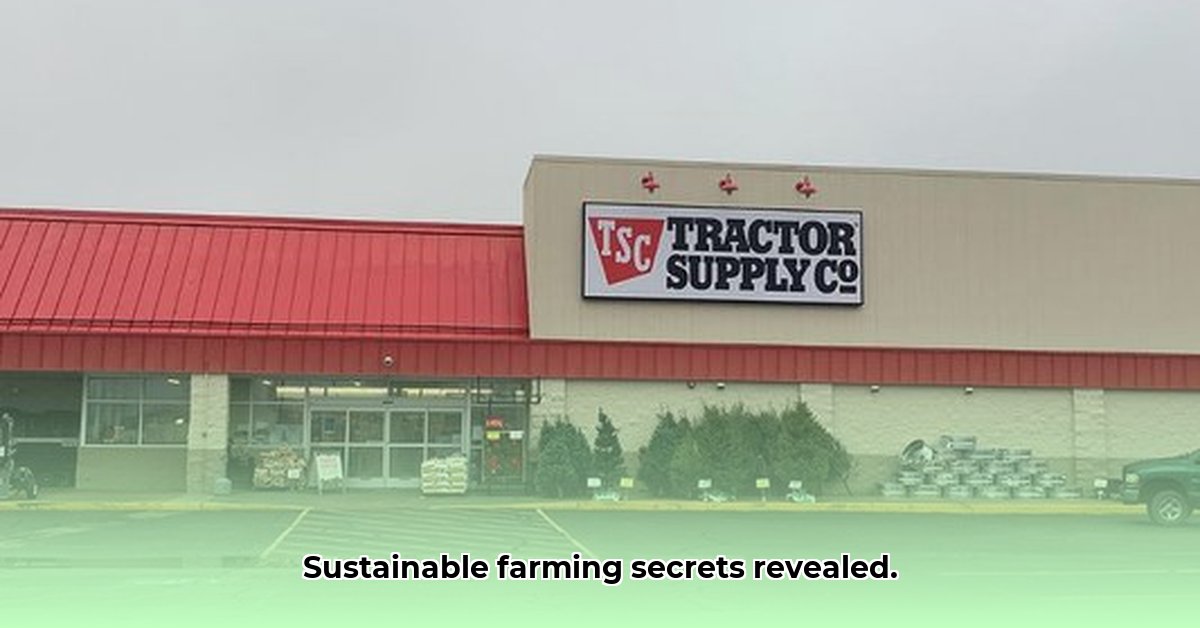
Tractor Supply Attica, Indiana: A Partner in Sustainable Agriculture?
Tractor Supply Company (TSC) in Attica, Indiana, serves as a vital resource for local farmers and gardeners. For example, consider sustainable seed options for improved soil health. While not explicitly branded as a purveyor of sustainable agriculture products, its wide array of goods plays a significant, albeit sometimes indirect, role in supporting environmentally conscious practices. This article explores TSC's current contribution to sustainable farming in Attica, identifies areas for improvement, and proposes actionable steps for all stakeholders—farmers, TSC, and local government—to foster a greener, more sustainable agricultural future.
Tractor Supply's Attica Offerings: Tools for Sustainable Practices
TSC Attica offers a diverse range of products relevant to sustainable farming and gardening. Livestock feed, seeds (including potentially heirloom varieties), soil amendments, fencing materials, and irrigation equipment are all readily available. This accessibility is a major advantage, consolidating many essential purchases into one convenient location. However, the lack of clear labeling regarding sustainability practices presents a significant obstacle for consumers seeking to make eco-conscious choices.
Limitations and Gaps: Navigating the Sustainability Maze
A key challenge lies in the absence of explicit labeling or clear categorization of sustainable products within TSC Attica's inventory. Consumers often lack the information needed to determine whether products are organically sourced, locally produced, or manufactured using environmentally friendly processes. This lack of transparency represents a missed opportunity to empower consumers and directly support sustainable agriculture. Furthermore, the absence of readily available data on the proportion of TSC’s inventory that aligns with sustainable practices makes it difficult to gauge its overall contribution to environmental stewardship. "It's frustrating to try and shop sustainably when you can't even tell which products actually are," notes Sarah Miller, a local organic farmer in Attica.
The Attica Community Connection: A Shared Resource
TSC's central location within Attica is a significant asset, providing easy access for farmers and gardeners alike. However, its role extends beyond mere product provision. The store has the potential to serve as a hub for community engagement and educational initiatives focused on sustainable agricultural practices. This untapped potential represents a substantial opportunity for growth and positive community impact.
Actionable Steps: Cultivating a Greener Future
Achieving greater sustainability in Attica's agricultural sector necessitates a collaborative approach involving consumers, TSC, and local governance. The following actionable steps can significantly advance this shared goal:
For Local Farmers and Gardeners:
- Demand Transparency: Directly question TSC staff about product sourcing, certifications (organic, non-GMO, etc.), and environmental impact. This proactive approach ensures informed purchasing decisions and demonstrates consumer demand for sustainable options.
- Provide Feedback: Use customer surveys and direct communication to express your preferences for sustainable products. Clearly articulate the need for clearer labeling and information regarding sustainable practices.
- Support Local Producers: Prioritize purchasing from local, sustainable farms and producers whenever possible, fostering a strong local food system.
For Tractor Supply Attica:
- Conduct Customer Surveys: Develop a targeted survey to gauge local consumer demand for sustainable products and gather actionable ideas for inventory improvements. Include specific questions about product preferences, desired certifications, and preferred packaging choices.
- Implement Educational Initiatives: Host workshops and seminars on sustainable agricultural practices. These events could feature local experts and provide valuable insights into composting, water conservation techniques, and organic farming methods.
- Partner with Local Organizations: Collaborate with local environmental groups, agricultural cooperatives, and other organizations focused on sustainability to create joint educational programs and community outreach initiatives.
For Local Government:
- Incentivize Sustainable Practices: Offer grants, tax breaks, or other incentives to encourage the adoption of sustainable farming methods by local producers.
- Promote Local Agriculture: Implement policies and programs that support local farmers markets and facilitate direct-to-consumer sales of locally sourced, sustainable products.
- Foster Public-Private Partnerships: Facilitate collaboration between TSC, local organizations, and farmers to implement comprehensive sustainability initiatives within the community.
Conclusion: A Harvest of Sustainability
TSC Attica possesses significant potential to become a leading advocate for sustainable agriculture within the community. However, realizing this potential requires active participation from all stakeholders. By engaging in open dialogue, embracing collaborative initiatives, and demanding transparency, we can collectively cultivate a more sustainable and thriving agricultural ecosystem in Attica.
Further Research: Uncovering the Full Potential
Further research is needed to fully understand the impact of TSC Attica on local sustainability. This could include detailed inventory analyses, comprehensive consumer surveys, and comparative studies with other retailers to identify best practices for promoting sustainable agriculture. Continued investigation will illuminate the path towards a more environmentally conscious agricultural future for Attica.